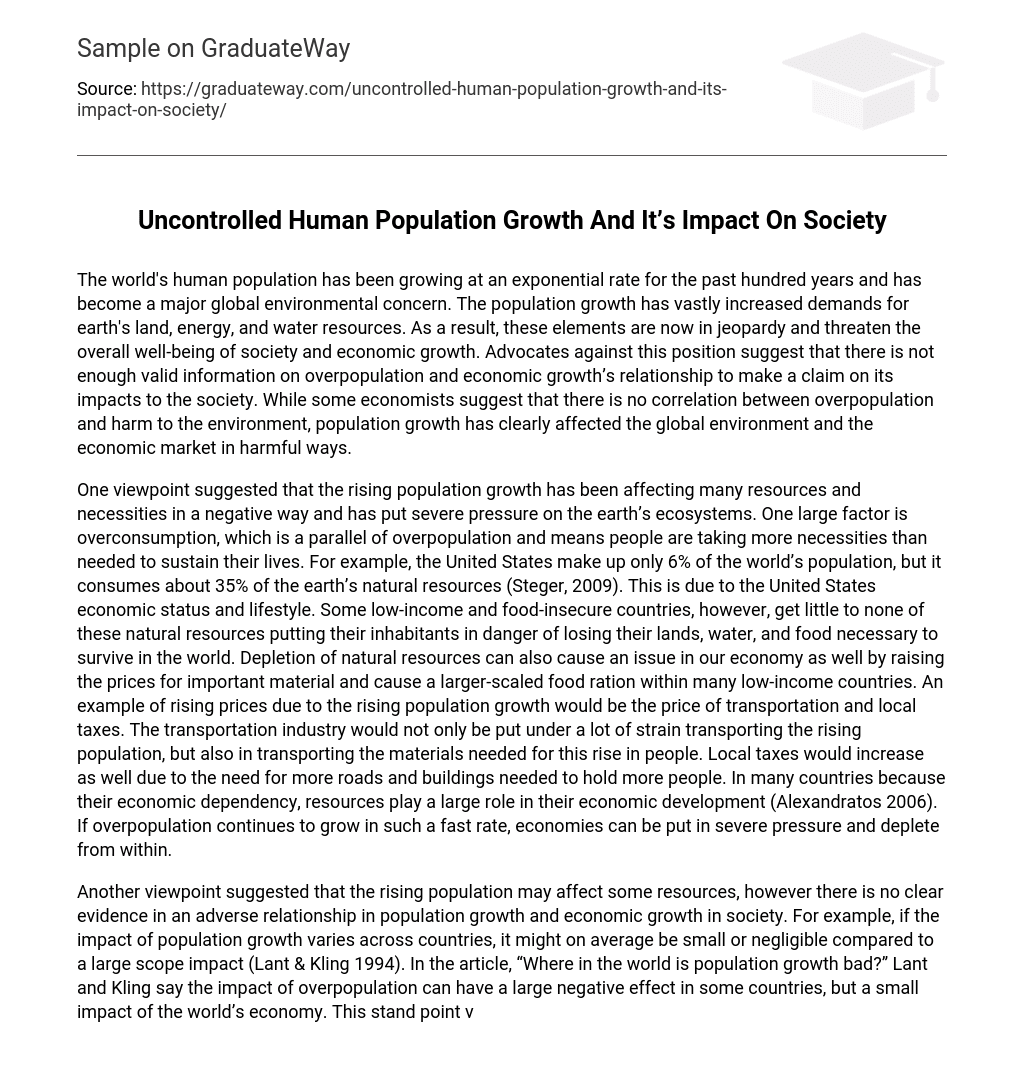The world’s human population has been growing at an exponential rate for the past hundred years and has become a major global environmental concern. The population growth has vastly increased demands for earth’s land, energy, and water resources. As a result, these elements are now in jeopardy and threaten the overall well-being of society and economic growth. Advocates against this position suggest that there is not enough valid information on overpopulation and economic growth’s relationship to make a claim on its impacts to the society. While some economists suggest that there is no correlation between overpopulation and harm to the environment, population growth has clearly affected the global environment and the economic market in harmful ways.
One viewpoint suggested that the rising population growth has been affecting many resources and necessities in a negative way and has put severe pressure on the earth’s ecosystems. One large factor is overconsumption, which is a parallel of overpopulation and means people are taking more necessities than needed to sustain their lives. For example, the United States make up only 6% of the world’s population, but it consumes about 35% of the earth’s natural resources (Steger, 2009). This is due to the United States economic status and lifestyle. Some low-income and food-insecure countries, however, get little to none of these natural resources putting their inhabitants in danger of losing their lands, water, and food necessary to survive in the world. Depletion of natural resources can also cause an issue in our economy as well by raising the prices for important material and cause a larger-scaled food ration within many low-income countries. An example of rising prices due to the rising population growth would be the price of transportation and local taxes. The transportation industry would not only be put under a lot of strain transporting the rising population, but also in transporting the materials needed for this rise in people. Local taxes would increase as well due to the need for more roads and buildings needed to hold more people. In many countries because their economic dependency, resources play a large role in their economic development (Alexandratos 2006). If overpopulation continues to grow in such a fast rate, economies can be put in severe pressure and deplete from within.
Another viewpoint suggested that the rising population may affect some resources, however there is no clear evidence in an adverse relationship in population growth and economic growth in society. For example, if the impact of population growth varies across countries, it might on average be small or negligible compared to a large scope impact (Lant & Kling 1994). In the article, “Where in the world is population growth bad?” Lant and Kling say the impact of overpopulation can have a large negative effect in some countries, but a small impact of the world’s economy. This stand point views the situation on the rising population as a negative impact only to some countries and our concentration should be focus on those countries where the efforts to reduce population growth can give the greatest payoff. This standpoint on the subject is valid, however the rising population is still affecting the amount of resources and materials us humans can receive. This enables countries with the social economic powers to take as much as they want but prevents low income countries to take little to no resources.
I personally found this topic interesting because I never really thought of the growing human population as a threat to the world’s overall health. However, after reviewing both sides of the argument I have realized that I side predominately with Steger and Alexandratos because they side with the harms the rising population has on the hole planets and individuals countries rather than the Lant and Kling’s viewpoint. I felt Lant and Kling’s stand on the issue was fair but seemed cold using overall statistics rather than envisioning the issues in a more global and interpersonal view. This topic has made me more cognizant of the ever growing human population and the adverse effects it has on the planet’s environment.
Although some economists advocate that there is no supporting evidence for a negative relationship between overpopulation and harm to the environment, population growth has clearly affected the global environment and the economic market in harmful ways. Such as in the ways of overconsumption, depletion of resources, and economy, the rising population has an adverse relationship with these important factors of society. Lant and Kling, in their viewpoint on overpopulation stated that there is a small average impact on the planet’s economy, but certain countries’ economies can be left in ruin due to the severity of depletion to materials. In many countries today, economies thrive of the resource’s and materials they have and if the rising population gets to a point where that country is no longer able to sustain the population that country can extinguished from its own people.
References
- Alexandratos, N. (2005, July 06). Countries with Rapid Population Growth and Resource Constraints: Issues of Food, Agriculture, and Development. Retrieved from https://onlinelibrary.wiley.com/doi/abs/10.1111/j.1728-4457.2005.00064.x
- Lant, P., & Kling, J. (1994, Dec 31). Where in the world is population growth bad?, by Kling, Jeff; Pritchett, Lant. Retrieved from https://ideas.repec.org/p/wbk/wbrwps/1391.html
- Steger, M. B. (2009). Globalization: A very short introduction. Oxford: Oxford University Press.





